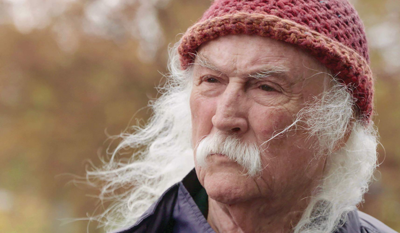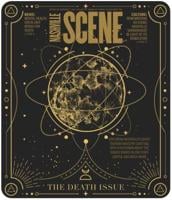
A new documentary from director A.J. Eaton presents famed folk musician David Crosby, now 78, as the antihero in his own life story — he’d be tragic if he didn’t come across as a willful screw-up. While Crosby remains on his best behavior in front of Eaton (producer Cameron Crowe conducted most of the film’s interviews), the catch is he’s well aware of his own responsibility for most of his life’s misfortunes. Crosby admits to getting three women hooked on cocaine and heroin, and the major artistic collaborators of his life — Roger McGuinn, Stephen Stills, Graham Nash and Neil Young — now can’t stand him.
Given the dramatic life Crosby has led, the first half of David Crosby: Remember My Name does a decent job of focusing on his music, although the film as a whole is more interested in Crosby as a person. Eaton and Crowe don’t avoid the Behind the Music-style narrative, but rather complicate it: Getting clean did not redeem Crosby, nor did it turn him into a nice guy. After being kicked out of the pioneering folk-rock band The Byrds in 1967, he went on to find a much larger degree of fame with Crosby, Stills, Nash & (sometimes) Young.
Feeling desperate after the 1969 death of his girlfriend Christine Hinton in a car accident, Crosby recorded his first solo album If I Could Only Remember My Name with friends like Jerry Garcia and Joni Mitchell rallying around him. To me, its dazed psych-folk songs are far more compelling than CSN’s mellow harmonizing, and while it was a hit upon its 1971 release, drugs soon derailed Crosby’s career. He has only recently picked up the thread and carried on with his solo work, releasing three albums in the past three years. His current label BMG produced this film, undoubtedly hoping it will revive interest in his music.
Crosby’s drug use wrecked his health — in the first scenes of this film, he informs the audience that he’s diabetic, has eight stents in his heart and needed a liver transplant due to hepatitis C. Later, he says he expects a fatal heart attack in the next few years. He’s also recently gained attention through his Twitter feed, where he often comes across as an amusingly cranky boomer. This film shows that the crankiness isn’t an act, and is pretty hard to live with. (Promoting the film recently on a Hollywood Reporter podcast, Crosby thought the interviewer’s questions were banal, got furious and was kicked out of the studio after half-an-hour.)
This is a very conventionally constructed documentary, drawing on contemporary interviews with Crosby and other musicians, archival clips and occasional animation to depict scenes from the past. Its interest relies on the fact that Crosby is a fairly charismatic interview subject who’s quite self-aware about the damage he’s done to himself and other people. However, one wishes Eaton and Crowe had pushed him further.
In recent years, baby boomers have largely gone from self-mythologizing as the victors of the ’60s and ’70s to becoming the contemporary villains du jour. David Crosby: Remember My Name never reduces Crosby to a symbol of his generation, but it shows how his wealth and privilege have given him more than his share of second chances. The opening scenes show Crosby desperately wishing that he had more time in his life; his current spell of productivity feels like a belated attempt to make up for the 18-year break between his first two solo albums. One suspects this film’s outtakes might provide an even more unvarnished portrait of Crosby. Even so, it’s an honest and compelling assessment of him as a musician and man.





